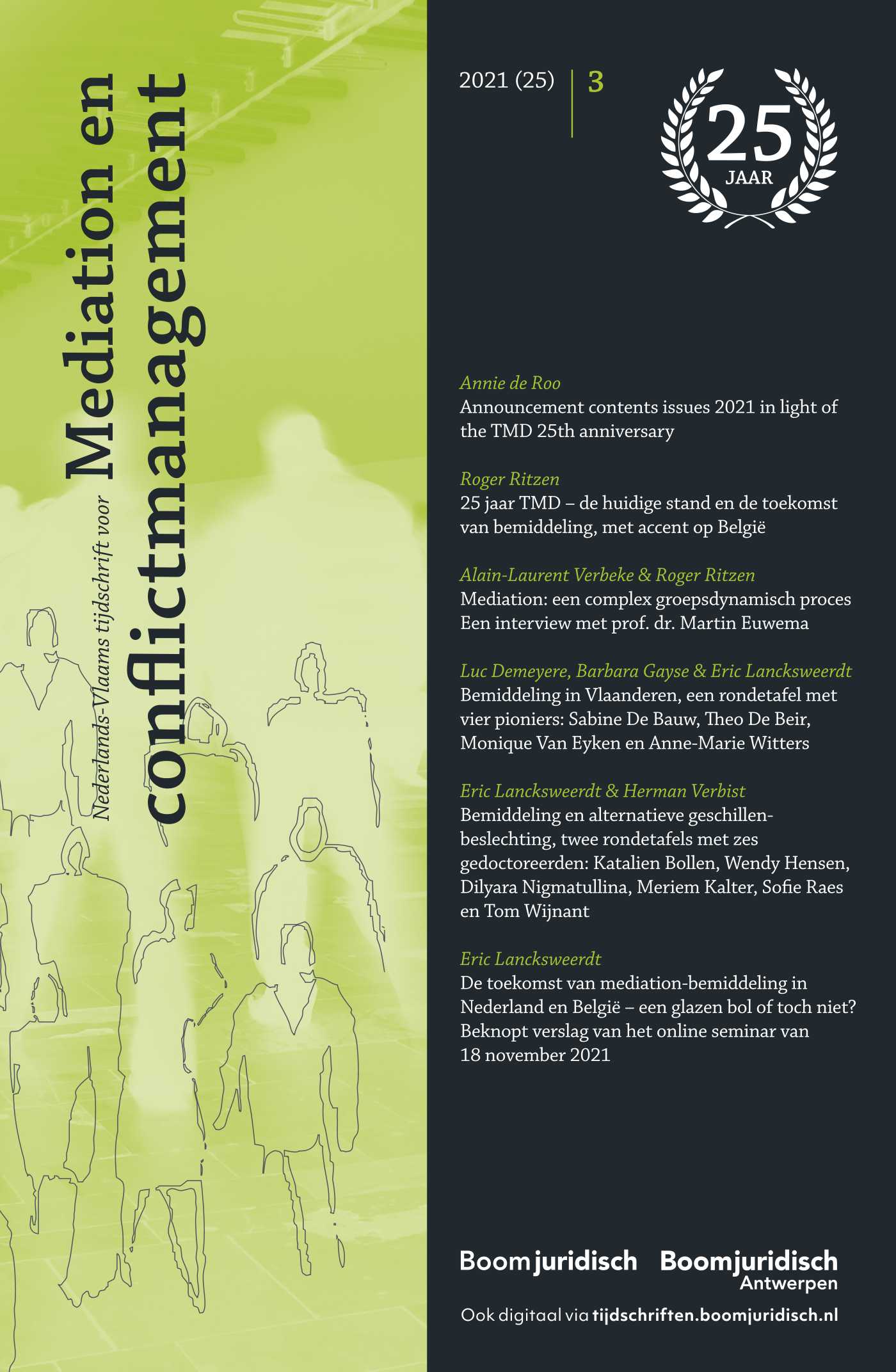|
In his column ‘Versterking alternatieve geschilbeslechting in consumentenzaken door richtlijn ADR en verordening ODR’ Koos Nijgh, head of the legal department of the ‘Stichting Geschillencommissies voor Consumentenzaken (SGC)’ gives an overview of how the SGC should anticipate the recent European legislative developments regarding ADR. After a brief summary on how the SGC functions, he analyses the European legislative demands and the policy the SGC has adopted. The author concludes that the impact of the new legislation is overseeable and that the SGC will do even better in the future. |


Nederlands-Vlaams tijdschrift voor mediation en conflictmanagement
Meer op het gebied van Mediation en herstelrecht
Over dit tijdschriftMeld u zich hier aan voor de attendering op dit tijdschrift zodat u direct een mail ontvangt als er een nieuw digitaal nummer is verschenen en u de artikelen online kunt lezen.
| Redactioneel |
Buitengerechtelijke oplossing van consumentengeschillen |
| Auteurs | Stefaan Voet |
| Auteursinformatie |
| Column |
Versterking alternatieve geschilbeslechting in consumentenzaken door richtlijn ADR en verordening ODR |
| Trefwoorden | SGC, Geschillencommissie, consumentenzaken, consumentengeschillen |
| Auteurs | Mr. Koos Nijgh |
| SamenvattingAuteursinformatie |
| Artikel |
ADR en ODR voor consumentenzaken in bewegingEnige juridische implicaties van de Europese ADR-richtlijn en ODR-verordening voor het Nederlandse ADR-landschap |
| Trefwoorden | consumentenzaken, ADR-richtlijn, ODR-verordering, implementatie Europese regels |
| Auteurs | Eline Verhage |
| SamenvattingAuteursinformatie |
|
Medio 2013 the European legislator adopted Directive 2013/11/EU (ADR Directive) and Regulation 524/2013 (ODR Regulation), both in the field of European consumer redress. The Directive and Regulation aim to promote the simple, fast and digital (out of court) resolution of consumer disputes. The Directive must be implemented no later than July 2015. This article describes some hurdles the Dutch legislator must overcome to successfully implement the Directive into the self-regulatory Dutch Consumer ADR system. |
| Artikel |
Consumer Dispute Resolution (CDR) in Europe |
| Trefwoorden | Consumer Dispute Resolution, CDR, national cultures, CDR-models |
| Auteurs | Naomi Creutzfeldt en Christopher Hodges |
| SamenvattingAuteursinformatie |
|
This paper is a combination of the ‘Oxford study 2012’ (C. Hodges, I. Benöhr & N. Creutzfeldt-Banda, Consumer ADR in Europe, Oxford: Hart Publishing 2012) and subsequent publications about consumer dispute resolution in Europe. Recent EU legislation aims to establish a EU-wide framework for consumer alternative dispute resolution (CADR or CDR) schemes and a platform for online dispute resolution (ODR). This forces member states to revisit their existing CDR models and in some cases, to modernize their structures. Many member states face challenges of reform of existing systems by the directives implementation date of 2015. This paper will provide an overview of CDR, the development of current legislation and discuss some national examples. The paper concludes with comments about implementation of the directive and potential future direction. |
| Artikel |
Interview met Kamerlid Ard van der Steur: de wetsvoorstellen bevordering mediation |
| Trefwoorden | wetsvoorstellen, registermediator, kwaliteitseisen, rechtsbijstand |
| Auteurs | Rob Jagtenberg en Herman Verbist |
| SamenvattingAuteursinformatie |
|
Mr Ard van der Steur MP for the Dutch Liberals (VVD), has introduced three interconnected private member bills to anchor mediation more firmly into the Dutch legal system. This initiative grew out from dissatisfaction over the truly minimal implementation of EU Directive 2008/52 in the Netherlands. For one thing, the bill envisages stricter quality standards and registration requirements. Professional privilege, for instance, will only accrue to those who meet all requirements as Registermediators. Another interesting aspect of the bills concerns the duty for parties to indicate to court in the writ of summons whether mediation has been attempted, and if not, why not. If a legal question arises while a mediation is pending before a Registermediator, the latter may refer that question on behalf of the parties to a cantonal judge electronically, whereas proviso is made for the judge handing down judgment at short notice, in order not to interrupt the flow of mediation more than necessary. These are just some of the innovative aspects of the bills that are being discussed during this interview at the premises of the Dutch parliament. |
| Artikel |
Dispute Management as a Means of Value Based Corporate Governance |
| Trefwoorden | Viadrina Component Model, CMRM model, Conflict Spider, Dispute Management |
| Auteurs | Cornelia Schmidt en Michael Hammes |
| SamenvattingAuteursinformatie |
|
Disputes are part of a company’s daily business reality, involving a broad range of internal and external stakeholders. As disputes may have significant consequences in terms of costs and damages, it is crucial that disputes are managed in a ‘wise’ manner. In this context, PwC and the Institute of Conflict Management at the European University Viadrina Frankfurt (Oder) initiated a broader ten years research project. The fourth and most recent survey was published in October 2013 and examines the question of how dispute management can be established as a means of value based corporate governance. The survey describes how disputes can be successfully managed by employing a professional framework and associated tools. |
| Casus |
Invoering van familie- en jeugdrechtbank in België |
| Auteurs | Steven Brouwers |
| Auteursinformatie |
